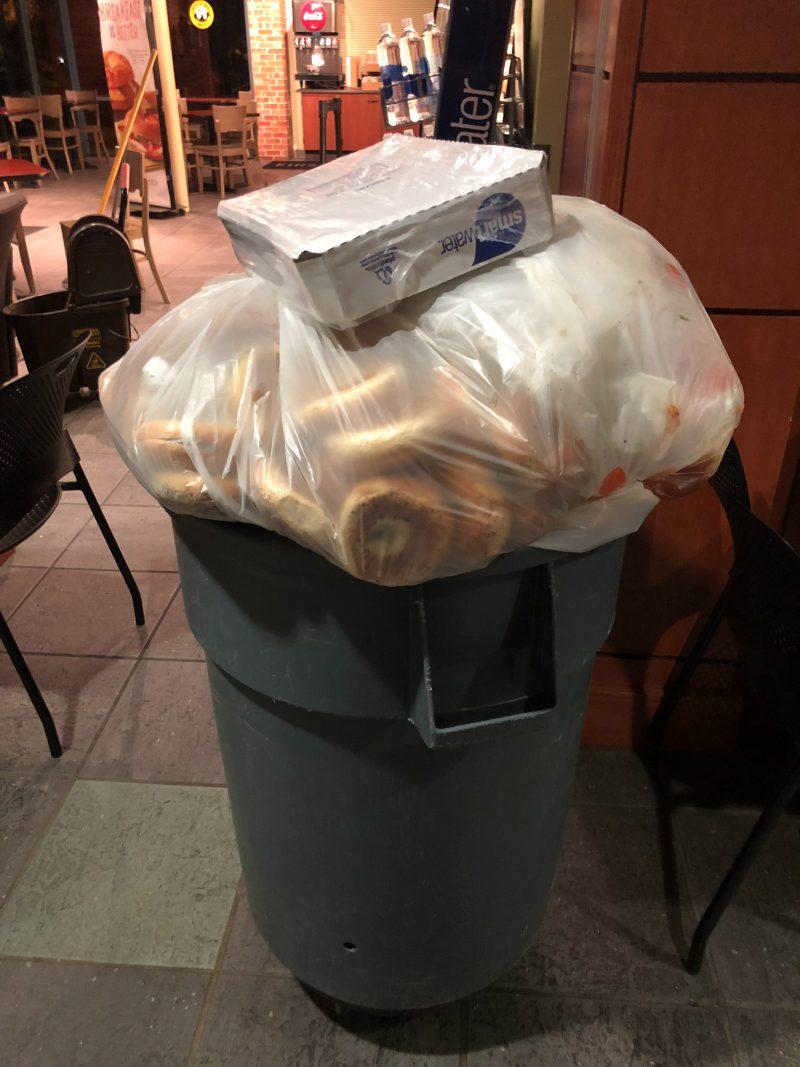According to Sharon Curry, sustainability coordinator, Mabee alone produces about 4.23 tons of trash weekly, and much of that is food waste. In the process of providing multiple food vendors and an open buffet for Trinity’s 2,500 students plus faculty and staff the university produces a substantial amount of food waste.
However, Trinity and Aramark have several processes that attempt to minimize their contribution to landfills, including a compost and recycling system.
“We are very mindful of what’s going on. One thing is you know people are always concerned about the amount of food waste that we have [at Mabee dining hall], but for an all-you-can-eat kind of program, there’s always going to be a little of waste just because if we had zero waste we wouldn’t have any food out,” said Charles Robles, food service director of Aramark.
Mabee creates blank amount of pre-consumer food waste. To minimize this, Trinity uses a compost and recycling system with large bins called earth tubs. The compost is used throughout the campus in the soil to promote green life. Not only is this more eco-friendly, but if done correctly, it is more cost-effective.
“They put into the earth tubs approximately 125 pounds of pre-consumer food scraps daily. That is composted. It is held in the machine for 30 days,” said Sharon Curry, sustainability coordinator. “We take it out finish it elsewhere on campus, and then it’s used around campus.”
Several students have also attempted to contribute to Trinity’s progressive policies, though with varying results. Former Trinity student Madelyn Gaharan reached out to Aramark and worked with Robles to make Mabee dining more sustainable and environmentally aware.
“Most of the food was coming from really far away,” Gaharan wrote in an email interview. “So the first priority, along with Charles Robles in Mabee, was to find local food alternatives for the dining hall, which is primarily a much more sustainable food proactive, and second, usually tastes better. Additionally, composting became a more practiced sustainability option.”
Gaharan added that dining services goes beyond just composting food waste.
“Also, all oil has to be specially disposed because it’s really dangerous to just throw it away,” Gaharan said. “Last year, Mabee started collaborating with a company that actually uses the oil from the dining hall and converts it to bio-fuel, which is kind of cool.”
EcoAllies, an environmental awareness group, has also tried to aid in minimizing food waste by making the student body more aware. In recent years, the group has taken a more passive stance on the issue by placing informative posters on food waste throughout Mabee.
“Last year there were signs at the conveyor belt in Mabee where people drop off their food, and they said something like, ‘This percent of food is wasted,’ and things like that just to make people think about how they were taking more food than they were eating,” said Katherine Jones, sophomore and EcoAllies president.
Though Mabee has a very progressive and comprehensive compost plan, none of the the food options in the commons takes part in it. This can be particularity wasteful due to the amount of food the vendors throw out.
For instance, according to an Einstein Bros. Bagels employee, policies require them to throw out their bagels after four hours due to them becoming stale. The lack of composting is due mainly to lack of space in Trinity’s composts on the Mabee loading dock and the inability to transport food waste from Coates to lower campus without contaminating the food.
“We don’t have the space. It is a space limitation. That’s out biggest challenge right now, is space. There’s also [finances needed] to set up a program,” Curry said. “You have to have bins you have to have all of that, so there’s an investment that goes into that. So when you add space plus the financial outlay and the terms of payback, we’ve been going after lower hanging fruit.”
Aramark and Trinity have hopes for growing their food management programs and continue to make Trinity an eco-friendly campus.













